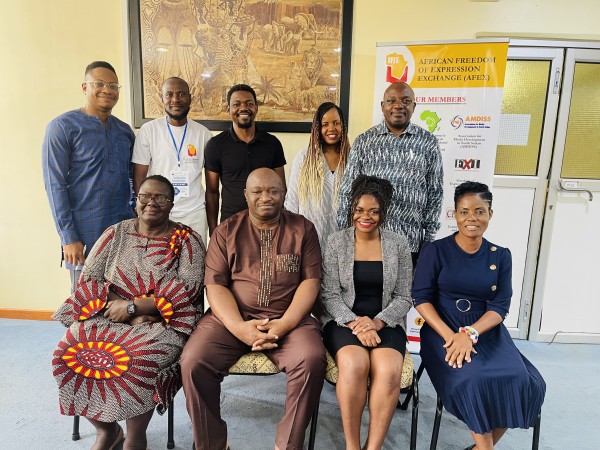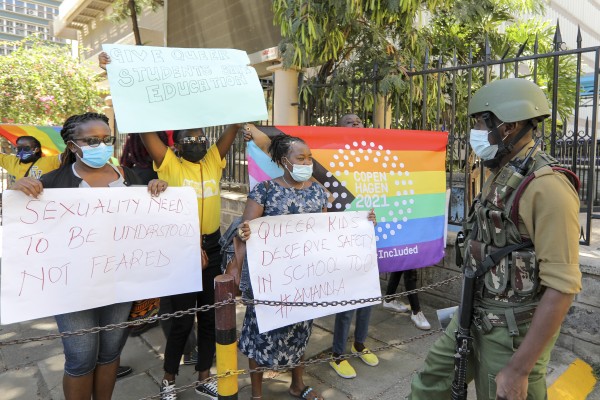International Press Institute (IPI) Director David Dadge on Friday addressed the Pan Africa Media Conference in Nairobi, Kenya, as part of a panel entitled “Media Freedom: A Balance Sheet.”
In his speech – “Learning to Let Go: How the Refusal of African Presidents and Political Parties to Relinquish Power Harms Media Freedom” – Dadge told his audience of media leaders and political figures from across the continent that Africa will only have a free and independent media when its “strongmen” “learn to let go” and relinquish their grip on power.
“It is my contention that the arrest and imprisonment of journalists, the shuttering of newspapers, the closure of radio stations, the banning of political programs, assaults on the media at political rallies and by police officers and the military, the ejection of foreign journalists, and the jamming of foreign broadcasts often happen because governments are intent on furthering their grip on power,” said IPI Director Dadge at the conference.
“What, then, is my message to the presidents and the political parties who desire to retain power? It is quite simply, you must, if you believe in democracy, learn to let go. If you do not like the talk on the political television program: Learn to let go. If you do not like the opinion piece in the leading newspaper: Learn to let go. If you do not like the comments on the popular radio show: Learn to let go.”
Countries with long-serving leaders have poor records oh press freedom. According to press freedom rankings by Freedom House, Burkina Faso, where Blaise Compaore has governed since 1987, is ranked 86th in the world; Chad, where Idriss Deby won a third term in 2006, is 165th; and Zimbabwe, where President Robert Mugabe has ruled since 1980, is 186th.
Countries with entrenched parties also rank poorly. Ethiopia, where Prime Minister Meles Zenawi and the Ethiopian People’s Revolutionary Democratic Front (EPRDF) have ruled since 1995, is ranked 165th; Eritrea, where the ruling People’s Front for Democracy and Justice has twice cancelled national elections – in 1995 and 2001 – is ranked 190th.
Many countries in Africa suffer from political unrest, which has resulted in the deaths of a number of journalists, most notably in the war-torn state of Somalia. According to IPI’s Death Watch figures, between 2000 and the end of 2009, 55* journalists were killed in Sub-Saharan Africa, including 14 journalists in 2009, nine of them in Somalia.
Impunity for the attackers of journalists, difficulty accessing information, statuary regulation of the media, criminal defamation and insult laws are also problems across the continent.
In July, Gambian President Yahya Jammeh warned journalists against tarnishing Gambia’s image, in a statement to state-owned GRTS television.
“Any journalist who thinks that he or she can write whatever he or she wants, and go free, is making a big mistake,” Jammeh declared. “If anybody is caught, he will be severely dealt with.”
In his speech, IPI Director Dadge praised the bravery and courage of those working in the media across Africa who continue “to report on corruption issues while knowing the dangers.”
The two-day Pan Africa Media Conference started on Thursday 18 March in Nairobi, Kenya, and featured speakers including Benjamin William Mkapa, a seasoned journalist and former president of Tanzania, Professor Kwame Karikari, executive director of the Media Foundation for West Africa (MFWA), Dr Mohammed ‘Mo’ Ibrahim, the Sudanese-born British mobile communications entrepreneur, Kenyan President Mwai Kibaki and Rwandan President Paul Kagame.
A PDF of IPI Director David Dadge’s full speech can be found in the side bar.
*This number was amended on 23 March 2010. The previous figure of 53 journalists killed in Sub-Saharan Africa between 2000 and 2009 was mistaken. IPI apologizes for any inconvenience this may have caused.


